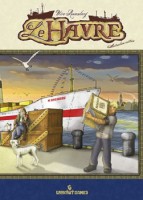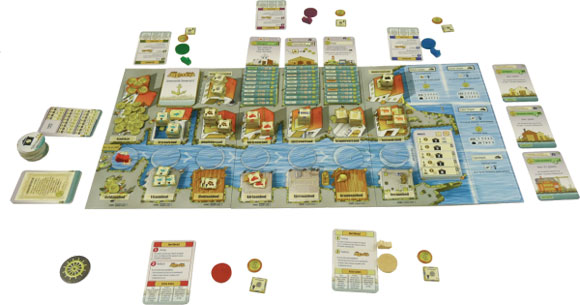
Le Havre
1-5
12+
30+
Manage a harbor, build ships and construct buildings in your bid to become the merchant with the largest fortune and the most power in Le Havre.
Take control of resources, process them, sell them, and turn them into food to feed your hungry workers. Construct or buy up buildings or ships to prove that you are the master of Le Havre!
Le Havre is an economic construction strategy game designed by Uwe Rosenberg, the designer of other hit board games such as Agricola and Ora & Labora.

Digital Version:
A digital version of this game is available!
Check it out! >
User Reviews (7)
Add a Review for "Le Havre"
You must be logged in to add a review.


Uwe Rosenberg has made his fair share of crunchy economic games. This one is by far the toughest to get things going o on yet that I have played
Gameplay/Replay
For as hard as it is to succeed at playing, it is surprisingly simple in execution. On your turn you have two options, place your one and only worker on a building, or take all of an available resource from the board. Where this game gets brutal is in how rounds play out. You need goods to build buildings and boats, but you also need money and food to meet your feeding requirement (which increases incrementally throughout the game) at the end of the round (which consists exactly 7 actions divided between 2-5 players) In most cases that leaves you precious little time to get anything moving. Grab those fish, take them to the smokehouse (if it is even available) and hope that is enough food for a round and a half so that maybe in the next round you can get a building built (which is where you get the VP. Many buildings you build can be used by other players for a modest coin or food payment, and at times that can give you just enough to get by for the round. It is a tight unforgiving game. But that’s what makes it a good one as well.
The Bad
Oddly enough the good is also the bad, you feel like you are working your a** off and accomplishing nothing of note. And it is not newbie friendly,it took me 12 of the 15 game’s rounds for it to click how I needed to go about my business, which by then was far too late.
In conclusion
If you love heavier euros, this is a pretty good one, as soon as I was done I felt frustration coupled with a desire to try again. Overall I recommend it for the heavy gamer
I was really keen to try this one out, since I loved Agricola. And yes, it really feels like Agricola a few centuries later. The basic concept is the same, that is you pick one of too many options (meaning that you constantly feel you don’t have the time to do all the stuff you want to do), and just as in Agricola the components have mutliple use and can be collected and converted, so there are many roads to success.
Basicly you do the following on your turn:
1. Resupply
On the game board there are a row of “offers”, and on each players turn you resupply some of them (they accumulate just as many of the things in Agricola). That’s what the tiles on the water does that you place your little ship on if you’ve peeked on the images.
2. You pick an action which is basicly:
Grab an offer, that is take all the accumulated goods there
or
Make another action like building some sort of building or a ship. Some buildings are used to refine your goods (like turning hides to leather) others are used to build other stuff (like the wharf that is used to build ships).
Just like Agricola you need to provide food at certain times in the game, and a key to this is to build ships, because they will reduce the needed food.
The game is tight and I guess if all players are good it will be really hard to make the right choices. It also takes some time, and I recommend only playing this with people that stay focused on the game. But if you liked Agricola this has the same “feel”. But I must be clear, this is NOT Agricola, there are many other mechanics and even though both games are about timing this is a different beast. I liked it alot, but I do think this is not for everyone.
Le Havre, a successor to Agricola, is effective at distilling and refining the challenges of Agricola to make the overall game one of the best.
The game is all about the francs, it is the currency and victory condition for the game. During the game francs can be used for buying buildings or ships, paying entry into buildings or buying food.
Unfortunately for you the francs are not easy to come by and take a great deal of resource collecting, resource upgrading and selling. This gets to the main point of le Havre, Shipping.
Ships are the cornerstone of the game, providing constant food source and the ability to make bank by delivering goods for francs. Given this, the warf (ship construction) and the shipping lanes (sell goods) become the highly contested actions in the mid to late game.
Worker placement is quite strategic as when you take resources you do not move your worker, and thus you can occupy a building and effectively block your opponents for a number of turns.
The things that makes this game really stand out to me over Agricola is that victory points (francs) are useful throughout the game and that your aren’t scrambling at the end trying to fill all of the gaps in your farm.
Overall a great game assuming your opponents are patient and can appreciate the balance needed between gathering, construction and shipping.
Le Havre is not for the faint of heart. It’s a fairly long game, and not terribly forgiving. There aren’t any random factors to blame when everything inevitably goes sideways two or three hours in. But it’s definitely worth playing.
If you’re unfamiliar with the game, this is a game in the worker-placement idiom: on many of your turns, you’ll play a piece somewhere in the playing area to choose a particular action. In Le Havre the set of those possible actions increases as the game goes along. At the beginning of the game, you’ll be able to see the potential actions that will be available later – but you won’t (quite) know in what order they’ll arrive, or when.
Your goal is to have the most assets. Buying or producing goods, then selling them locally will make you money. Building or purchasing a ship or building will increase your portfolio. Shipping goods to far markets can be still more lucrative. And while that sounds easy enough, there are lots of potential resources to manipulate, and many ways to manipulate them.
In the end, the game is about opportunity and timing. You’ll want to manipulate the choices of the other players to ensure that the goods and resources you need are available to you; that the buildings you need to use are constructed in a timely manner; that the others find greater potential in colliding with one another than with you. It’s not remotely a multiplayer-solitaire game: everything you do has repercussions to the others in the game.
My bottom line? After 20 plays, it’s still something I’m wanting to get to the table.
This game is great with three or less people. The more people the more complicated and the turns take forever. Me and my one friend played full games of Ascension on my phone between our turns with six of us. If you like resource and work placement the game is great. The game is really well made and while it does look intimidating once you have the game play down it is pretty straight forward. If you enjoy games like Puerto Rico and Agricola you will be right in your wheel house with this game.
This game is one of 3 connected games and is my favorite of the 3 by this designer. The first was Agricola. This game was, as I understand it, brought about because of the criticisms of Agricola. If you are not a fan of Agricola you should check it out, if you are a fan you will probably consider it Agricola light.
There are a number of rounds based on the # of players. In each round you will get to do a number of actions dependent on the number of players. The game is about earning victory points through building buildings that have game effects and earning additional money through shipping and “renting” the buildings to other players or using buildings that generate money. All money=victory points. The resources are wheat, fish, francs, wood, clay, iron, coal, and cattle. On the board are spaces for each resource and you start the game with2 francs, 2 wood, 1 clay, and 2 fish on there respective spaces. There are 7 markers in a row on the board. These are placed randomly face down on the board and will not change order when revealed for the rest of the game. Additionally there are 3 building slots on the board. The buildings for the game are shuffled and divided randomly between the slots. They are numbered and placed in ascending order on the slots. Each player starts with 5 francs and 1 coal. The 1st player then places their token(a small wooden ship) on the 1st marker revealing it. Each marker adds 1 each of 2 different to the proper spot on the board, i.e. 1 clay and 1 wood, or 1 franc and 1 iron, etc… The player then takes an action. The actions are 1)claim all of a resource that is on a space on the board, 2)visit a building, pay the rent if any(gold or food), and then use the building’s ability. You may additionally buy as many buildings as you can afford or purchase ships(this does not happen often), pay off loans and sell buildings for 1/2 their value. There are 3 buildings that start the game owned by “The town”. These are all places that allow you to build buildings. Buildings require a combination of wood and clay and sometimes iron to be built. To use a building you have a disk you place on that location, pay it’s rent to the owner, then use the action indicated. Besides building, actions include gathering extra resources, earning money through selling resources, converting resources, etc… All resources have enhanced versions of themselves that can be created for game purposes by visiting the proper building. Once all players have their ship token on a marker, let’s use 4 players as an example, the 1st player moves his to the next unrevealed marker and takes an action, followed by the 2nd, and the third. In this way the 1st,2nd, and 3rd get 2 actions in the first round and the 4th gets 1 action.(7 markers) The 2nd round the boats are moved in order that they are on the board to the beginning of the row of markers, so the 4th player is now 1st, 1st is 2nd, etc… There are enough rounds that each player gets an equal number of turns. At the end of each round you have to feed your workers. The amount depends on the 3 of players. At the beginning of the game there is only fish, but whenever food is required gold can be substituted. If you cannot feed them you can take a loan to make up the difference. The card indicating the amount needed is then flipped over and reveals a ship that can be built. Ships allow you to automatically provide some food at the end of each round and they are used to ship goods to earn additional money. Additionally , at the end of the round if you have at least 2 cattle or 1 wheat you will get an additional 1 of the appropriate type if it is a harvest round. These are the basic rules of the game. As well as being a great 3-4 player game, it is an excellent solo player game.
I’ll be honest with you, I don’t really like worker-placement games. Agricola has the nice farm theme, which sometimes made me play it, but other games like Dominant Species I rather not play.
Le Havre I played only once with some friends, which took about five hours and gave us a headache. By then the game was not completely finished, but it ended due to overheated brains. Why?
This game gives you too many options. While in Agricola there are some options, in Le Havre it seems a possibility tree opens up every time you try to select some action. This makes it humanly impossible to foresee the outcome of your actions (also difficult in Agricola, but at least manageable). Thus the game becomes more like “I like this building, so I build it”.
Although I like involved games which take a lot of time (still trying to get people to play Europa Universalis), but this game gives little in return. If you like the farm aspect of Agricola and don’t mind much about strategy, don’t try Le Havre! For me it was once and never again…